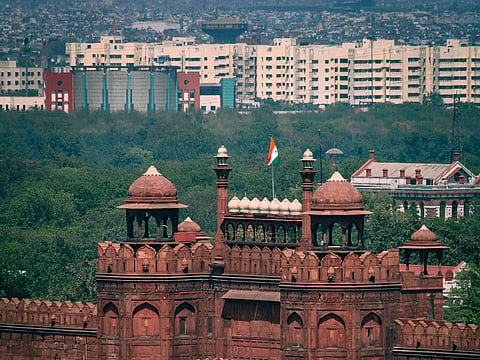
- Destinations
- Experiences
- Stay
- What's new
- Celebrating People
- Responsible Tourism
- CampaignsCampaigns
- SubscribeSubscribe
- Buy Now

A sudden blast near Delhi’s Red Fort on Monday evening has sent ripples across the travel and tourism industry. The explosion, which tragically claimed 13 lives and left many critically injured, occurred in a slow-moving car at the Subhash Marg traffic signal, near the Lal Qila Metro station. While security measures have been tightened across the city, international advisories from the US and UK have added to travellers’ concerns.
“After this bomb blast, advisory has been given from UK and US, and other western worlds are also watching very closely,” said Mr Ravi Gosain, President of the Indian Association of Tour Operators (IATO). “This is a matter of concern because travel insurance may not work on those regions, and we get lots of worry emails from our clients overseas.”
Despite the alarm, industry insiders remain cautiously optimistic. Gosain believes the impact will be short-term: “I think this will normalise. Passengers who have already booked will travel for sure, but for future bookings, queries may be affected.” He points out that advisories often amplify fear even when the actual situation is under control. “The best part is that the culprits are behind bars, and this has been solved. This will give a positive message, and we are also issuing guidance for our members so they can reassure their clients overseas.”
Tour operators, hoteliers, and government agencies have quickly begun coordinating to manage the fallout and communicate responsibly. “At the moment, there is not a major concern. It is a one-time event, and such incidents happen around the world,” Gosain said. He emphasised that this is different from political uncertainties like India-Pakistan tensions in recent months, as the incident was localised and did not affect the entirety of Delhi. “India is a big country, and this happened in one particular area. I think this will go away quickly.”
While there is a standard crisis protocol in place for tourism, Gosain explained that action is calibrated based on scale. “Sometimes the situation is marginal, and we don’t want to create panic by sending advisories. When we get lots of inquiries or concerns from foreign tour operators, then we take action. Otherwise, it will normalise as media reports that the culprits are behind bars.”
Delhi’s tourism has faced challenges before, from pollution warnings to security incidents, yet it has always bounced back. Gosain believes the city’s resilience remains strong. “Pollution is actually a bigger matter than this news. Tourists often avoid Delhi during certain months, but they just move on to other cities. So, this is a bigger problem in general than this one incident,” he said.
For travellers considering Delhi, Gosain urges calm and careful observation. “The first two or three days after the incident were critical. Now, concerns are slowing down. We are not getting many messages from members or their clients overseas. We advise them to keep a watch, and if the situation aggravates, then the association will issue advice.” He stresses that visible safety measures, proactive communication, and trust-building will be key in reassuring both domestic and international visitors.
The broader travel industry echoes this measured outlook. Bookings at hotels and luxury villas have remained strong, and domestic tourism is expected to rebound quickly. Gosain remains optimistic that if no further incidents occur, inbound tourism sentiment will recover within a few months. “We need to show confidence and trust in tourists to come again,” he added.
While Monday’s blast was a stark reminder of the challenges urban centres face, Delhi’s status as both a destination and a transit hub is unlikely to be compromised. For now, the focus remains on reassurance, careful monitoring, and coordinated efforts to ensure the city’s rich history and vibrant culture continue to welcome travellers safely.
1. Is it safe to travel to Delhi after the Red Fort blast?
Authorities and tour operators say the situation is under control and safety measures are in place.
2. Will international travel advisories affect bookings to Delhi?
Short-term cancellations may occur, but tourism experts expect normalcy to return quickly.
3. How is the tourism industry responding to the blast?
IATO and local operators are coordinating with hotels and authorities to reassure visitors.
4. Has Delhi faced similar challenges before?
Yes, from pollution alerts to security incidents, but tourism has consistently bounced back.
5. What should travellers do if they have upcoming plans to visit Delhi?
Stay informed, follow local guidance, and expect enhanced safety protocols across the city.
